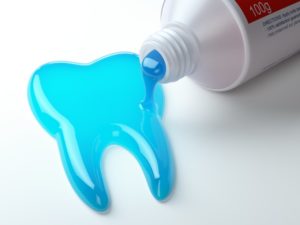
You may have heard some conflicting information about fluoride in the past. If you’re a parent, you may have even wondered whether it’s safe for your children. While there are a lot of misconceptions out there, the truth is that fluoride is perfectly safe and beneficial for smiles of all ages. In fact, it even makes your teeth healthier. To clear up any confusion you may have, a dentist in Centerville is here to answer a few common questions about fluoride.
What Exactly Is Fluoride?
Fluoride is a mineral that is found naturally in rocks, soil, and almost every water source on Earth, including the ocean. In fact, chances are that your drinking water contains fluoride. After many cities began fluoridating their water supplies in the 1940s, there was a significant decline in tooth decay. Because of this, most drinking water and toothpastes these days are fluoridated.
How Does Fluoride Prevent Cavities?
The outer layer of your teeth, called enamel, is made from phosphate and calcium. Your saliva also contains these minerals, and bathes your teeth to keep them strong.
When you consume carbohydrates, bacteria in your mouth feast on these particles and create acids. The acids attack your enamel, destroying the calcium and phosphate that protect your teeth from cavities. Saliva can stop this process by coating your teeth and re-depositing the minerals your teeth need.
Fluoride gives your teeth an extra layer of protection. When your saliva has fluoride in it from toothpaste or water, it makes your teeth much stronger against the acids that cause decay.
How Can You Get the Fluoride Your Smile Needs?
Most community water systems are fluoridated, but it never hurts to call your local government official, such as your mayor’s office, and find out for sure. Tap water often contains fluoride, but bottled water almost never does. While bottled water may be more convenient, tap water is much better for your oral health.
Additionally, be sure to brush your teeth twice a day with a toothpaste that has the ADA Seal of Approval. This means the American Dental Association has determined it has sufficient fluoride. Rinsing with a fluoridated mouthwash can also help.
Lastly, your dentist or hygienist can provide a topical fluoride treatment as part of your routine cleaning. This procedure should only take a few minutes, and it can significantly strengthen your teeth against cavities. They can also prescribe fluoridated toothpastes, gels, and mouth rinses to use in between appointments.
Despite any negative rumors you may have heard, fluoride is a completely safe and healthy way to reduce your risk of tooth decay. At your next checkup, ask your dentist how you can make sure you’re getting the fluoride you need.
About the Author
Dr. Daniel Passidomo is a dentist in Centerville, OH who obtained his Doctor of Dental Medicine degree in 1993 from the University of Kentucky College of Dentistry. During each patient’s checkup, he takes the time to sit down with them to discuss their unique oral health needs. He can determine whether you could use a topical fluoride treatment or a prescription fluoride product. To learn more about protecting your smile from cavities, contact Dr. Passidomo’s office at (937) 886-9935.








